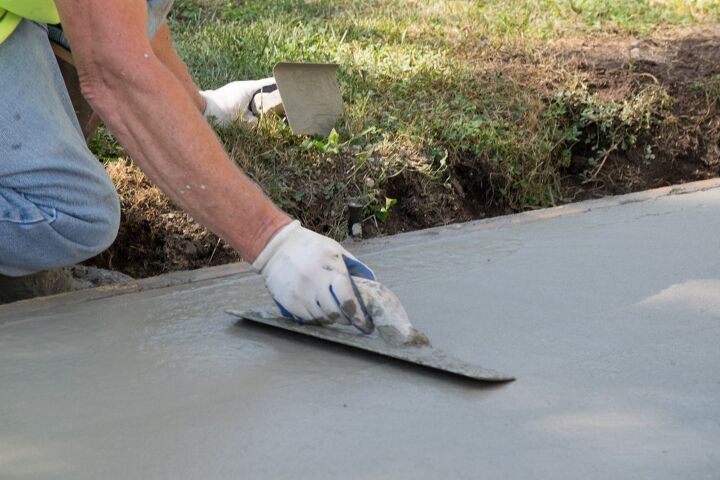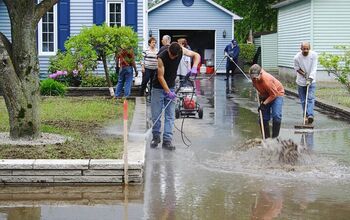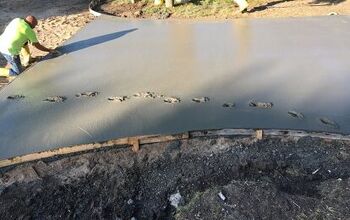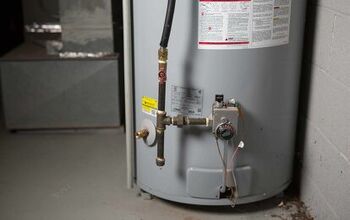Do I Need A Permit To Extend My Driveway? (Find Out Now!)

If you’re like most homeowners, you probably live in a home with a premade driveway that you may not have chosen. Over time, if your driveway no longer fits your needs, you may need to make it longer. Before you do this, it is important to determine whether or not you need a permit to extend your driveway.
Permit requirements vary by state and city, so you should always check with your local government and HOA first. But, typically, you need a permit to extend your driveway if it extends into a public road. However, if the extension doesn’t connect to the road, you may not need a permit.
Additionally, you will need a permit if you need to alter sidewalks, gutters, or curbs when extending your driveway.
Do You Need a Brick and Stone Floor Contractor?
Get free, zero-commitment quotes from pro contractors near you.

Do You Need A Permit To Extend Your Driveway?
Before you start any home renovation project, it’s important that you do your research. Some local government authorities require you to have a permit, and starting a project without one can lead to expensive fines. Permit requirements vary by city and state, so you’ll need to research your city’s driveway regulations.
Driveway extensions typically need a permit, especially if they extend into a public road. If extending your driveway alters sidewalks, gutters, curbs, or any other city property, you will need a permit. If the driveway extension does not connect to the road, you probably won’t need a permit.
Who Do You Contact About A Permit To Extend Your Driveway?
As always, contact local city officials to determine building codes and permitting required before you start the driveway extension. If you live in a rural area, contact the parish assessor’s office for regulations.
How Do You Know If You Need A Permit To Extend Your Driveway?
So how do you know if you’ll need a permit? It’s typically the responsibility of the contractor working on the project, but you should still get educated, as well. If you’re doing the project yourself, contact your city and state building code officials.
It’s also essential to know driveway length guidelines. Each local building and safety office will have its own codes and driveway construction guidelines, but rules vary by community. You will also need to confirm with your homeowners’ association that the project is approved.
Driveways should typically be 18 to 20 feet long for each vehicle in the driveway. Full-size pickup trucks, extended cabs, and oversized mini-vans require 22 to 24 feet of space. There should be 3 to 5 feet of space at the end of the driveway to walk around.
You should also consider fire truck access and turn around ability, especially if you have a long driveway. Longer driveways usually require a turnaround area so that you can back up your car and turn around easily. These driveways should be 10 feet wide by 12 to 14 feet deep.
Types of Driveway Extensions
When extending your driveway, there are four main types to choose from for your project. You can extend your driveway by using concrete, brick, gravel, or pavers. Ideally, you’ll want to select the same material as your current driveway.
Keep in mind that the cost of your driveway extension will vary depending on the material you use.
- Concrete Driveway — Concrete driveways are the most common driveways of homeowners. On average, concrete driveways are about $10 per square foot, including labor.
- Brick Driveway — Brick can give a more luxurious look to your driveway but expect to pay more for that. Depending on the demand for the materials, the cost will range from $10 to $15 per square foot.
- Gravel Driveway — If you’re on a tighter budget, gravel driveways are a great option. Gravel driveways typically cost $4 to $5 per square foot. This cost can increase if you live on a slope.
- Paver Stone Driveway — Paver stones can add a unique look to your driveway, and you can customize the design based on your preferences. The cost of a paver stone driveway is the most expensive and can range from $15 to $30 per square foot.
Other Concrete Projects That May Require a Permit
When you’re planning any concrete projects, you may or may not need a permit. Again, permit requirements will vary according to where you live, so check your local government. If you have a homeowners’ association, you’ll also have to check those laws, as well.
Some concrete projects don’t need a permit but don’t fall into temptation before confirming. Save yourself the hassle of paying a permit fine or experiencing difficulty when trying to finance, insure, or sell your home.
Here are common concrete projects that may require a permit.
Patio
If your concrete patio is less than 30 inches above grade, you most likely won’t need a building permit. However, your contractor may have to obtain an excavation permit. Before beginning your patio project, make sure that you won’t be digging near underground utility pipes or cables.
If you plan to add walls or a roof to your patio, you may need a permit.
Parking Pad
Instead of extending or widening your driveway, add a concrete parking pad as a solution for more vehicle space. Check with your local building code office before you reach out to a contractor to start the project. In some areas, parking pads are illegal, even on your own property.
Retaining Wall
If you want to put up a concrete retaining wall, you most likely won’t need a permit if the fence measures 2.5 to 6 feet tall. Of course, this depends on where you live. The soil type, the climate, and where you place the wall in relation to the property line may affect the permit.
In some cases, in addition to a permit, you’ll also need an engineer’s design and approval.
Walkway
The height of your walkway will determine if you need a permit to build a walkway. This can be a complicated project because the limit is 18 inches above grade. Typically, there is a width restriction of 18 feet, except in turnaround areas.
Factors like the location of the walkways in relation to other areas of your home will also determine if a permit is required. It’s best to double-check with your local building authority to be sure before you begin the project.
Do You Need a Brick and Stone Floor Contractor?
Get free, zero-commitment quotes from pro contractors near you.

Related Questions
How much does it cost to install a driveway?
The cost to install a new driveway usually ranges from $2,510 to $6,780, but the average price is $4,500. Expect to pay $2 to $25 per square foot for the average driveway for materials and installation. The overall cost will depend on the type of driveway you choose to install. Driveway prices can range from $1 to $50 per square foot based on the material and the dimensions of the area. A concrete driveway is $3,000 on average, whereas an asphalt driveway is $4,600. Other factors like the condition of the land and whether or not you’re replacing an existing driveway will impact the cost.
What’s the average cost to obtain a permit?
The cost of your building permit will depend on the size of the job. For small jobs like plumbing and electrical, building permits can range from $50 to $300. For larger jobs like building a house or remodelings, building permits can range from $500 to $2,000. The building permit cost can be a flat rate, price per square foot, or construction value. It will typically take about two weeks for your building permit to be approved and issued, so plan accordingly.
Related Guides

Stacy Randall is a wife, mother, and freelance writer from NOLA that has always had a love for DIY projects, home organization, and making spaces beautiful. Together with her husband, she has been spending the last several years lovingly renovating her grandparent's former home, making it their own and learning a lot about life along the way.
More by Stacy Randall























![Standard Dining Room Table Dimensions [for 4, 6, 8, 10 and 12 People]](https://cdn-fastly.upgradedhome.com/media/2023/07/31/9074335/standard-dining-room-table-dimensions-for-4-6-8-10-and-12-people.jpg?size=350x220)



